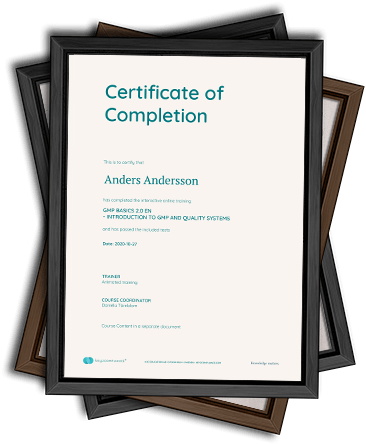Sampling - Medical Devices


Sampling - Medical Devices
Basic Level | English | Presentation | 1 hour and 59 minutes
Corresponds to 1 day of teacher-directed learning
Description
Does the US Food and Drug Administration (FDA) ever make a mistake? In the Preamble to the Quality System Regulation (21 CFR 820, Comment 85), they addressed sampling for Process Validation. Comment 85 says:
The requirement for testing from the first three production lots or batches has been deleted?. The number three is, however, currently considered to be the acceptable standard.
The FDA now admits that this guidance on a sample size of three is NOT statistically valid. They wish they could delete Comment 85 from the Preamble; however, to do this would take an act of the US Congress!
This webinar is targeted to professionals concerned with a specific application of valid statistical techniques to satisfy Process Validation requirements of the FDA:s Quality System Regulation. Sampling a product or process and measuring a quality characteristic is an efficient way to make an inference about the quality of all products or the entire process. Simply put, if it is too expensive to measure everything, then you would be wise to sample and measure a subset. If you decide to sample, then comes the age-old question: How much is enough?
This fast-paced webinar will cover the details of application without the burden of statistical complexity. Analysis results from popular statistical software programs will be illustrated. The presenter´s keep it simple approach will avoid statistical complexity - participants do not need to have a background in statistics.
The key to establishing Sample Size is to quantify the risks involved in making a decision on the quality of a product or process. At the end of this webinar, participants will be able to:
Create a risk-based Sampling Plan for a new production process
Apply fundamental statistical methods and tools for analyzing a production process
Describe the factors that influence sample size selection
Formulate risk-based decisions on the quality of a product or process
Express the risk involved in a data-based decision
This webinar is targeted to professionals concerned with the application of Sampling to meet the Process Validation requirements of the FDA's Quality System Regulation. The content should have great value to involved with: process development; manufacturing, process, and quality engineering; operations; quality assurance; quality control; and regulatory compliance. Through this overview of sampling, managers and members of the leadership team would see how value is added to a product or process.
There are no prerequisites for this webinar. No background in statistics is necessary.
Content
- Regulatory Context
- Quality System Regulation 21 CFR 820 and Preamble Comments
- GHTF Guidance for Process Validation
- Significant Trends and Warning Letters
- Demonstration of Best Practices
- Estimating Process Capability
- Graphical Tools
- Common Pitfalls
- Designing a Sampling Plan for New Production Processes
- A Checklist Approach
- Applying Statistical Methods and Tools
- Sample Size Considerations
- Applying Valid Statistical Software
- Expressing a Risk-Based Decision
Course module
1. Sampling - Medical Devices
This is dr. Peter Kneppel's lecture Sampling - Medical Devices.
Trainer: Peter Kneppel
Duration: 1 hour and 59 minutes (Total duration of the course: 1 hour and 59 minutes)
Course material
There is no additional course material for this course.
Notes
If you want to save your notes for this course, you first need to purchase it and be signed in.
Training organisation

Key2Compliance AB
Key2Compliance AB is an independent international organization providing its training and services to a variety of functions in the Life Science industry, from development to market in terms of Quality Systems and Regulatory compliance.
By helping organizations to comply with regulatory expectations, to enhance workforce knowledge and motivation and to promote a correct attitude towards quality, we believe we contribute to the supply of safe health care products - and in a wider perspective we save lives.
Trainer

Peter Kneppel
Dr. Pete Knepell is president of Peak Quality Services in Colorado Springs, CO. Since 1988 he has trained thousands of professionals in quality systems and quality improvement methodologies. His past clients include several defense agencies, the Canadian Red Cross, Sony, Corning, Texas Instruments, Xerox, Hewlett Packard, Heritage Valley Health System, GlaxoSmithKline, Amgen, GE Healthcare, Roche Diagnostics, Creation Technologies, SORB Technology, Baxter, Medtronic, Stryker, Zimmer, Varian, Ventana Medical Systems and Johnson & Johnson.
He helps his clients apply innovative methods and technologies to enhance process quality improvement. These include process validation, risk management, statistical process improvement, software quality improvement and Lean Six Sigma. For example, Pete directed a team that developed a Continuous Process Validation system for a large pharmaceutical firm. This system integrated a database with a graphical user interface (GUI) and a sophisticated statistical package. It was a validated system that meets FDA regulatory requirements. It was used to display and analyze historical and real-time data to monitor and improve product quality.
Läs merDölj
The course results in a diploma that shows that you have the skills required.
All prices shown exclude VAT.

Save time
Online education is faster than traditional education. We make the same courses and content accessible in just under a third of the time normally required.
The efficiency gain is due to the fact that there are no lunch breaks, no commute, no group discussions, and no breaks. However, the total time spent teaching always remains intact.
1 h - Equivalent to a half-day course
2 h - Equivalent to an all-day course
4 h - Equivalent to a 2-day course
6 h - Equivalent to a 3-day course
Please note that the duration specified does not include time for breaks or revision. Don't forget to set aside time for any workshops and time to take the tests of the course, which is required to earn a diploma.
Back to the course
Get started right away
Before you can start the Sampling - Medical Devices course, you first have to purchase it.
Back to the courseAdded to basket
The course Sampling - Medical Devices has been added to the basket.
Back to the course Continue to paymentWell done!
You have completed the Sampling - Medical Devices course, and you can now get your diploma.
Back to the course Get your diplomaThe trailer is now over
Before you can start the Sampling - Medical Devices course, you first have to purchase it.
Back to the courseResults
Before the examination questions can be marked and you can earn a diploma for the Sampling - Medical Devices course, you first have to purchase it.
Back to the courseTo the sign-in page
Before you can graduate the course and get your diploma, you need to sign in.
Sign in
